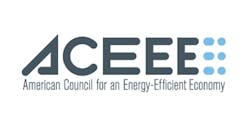
SAN DIEGO, CA — Equipment manufacturers, utility professionals, local, state, and federal agency personnel, plumbers and installers, policymakers, NGOs, engineers and other experts were all in attendance for the American Council for an Energy Efficient Economy's (ACEEE) Hot Water Forum, held March 7-9.
The forum is an opportunity to discuss the latest in energy- and water-saving innovations, as well as policy, regulation and legislation in the context of the broader economy. It comes at a pivotal moment for the nation. The emergence of new water-heating technologies combined with huge investments (made possible by the Infrastructure Investment and Jobs Act and the Inflation Reduction Act) has created a real opportunity for market transformation.
In addition, this year ACEEE presented the inaugural Hot Air Forum (HAF), which had as its focus decarbonizing space heating. The Hot Air Forum preceded the HWF and included a day to discuss the crossover between space and water heating.
Plenaries
The inaugural plenary session of the Hot Air Forum (HAF), When Decarbonizing the Air Side...Five Years from Now, Where Will We Be and Where Should We Be? was presented by Kandice Cohen of Trane Technologies, where she is Director, Electrification of Heat. The session talked about the "big picture" and what's needed to tie together policy and programs through collaboration. Her plenary also helped set the context for the detailed sessions that followed.
The combined HWF/HAF plenary on Wednesday morning, A Vision of the Policy Future – Policies, Funding, and Approaches for Energy and Emissions from a Federal and State Perspective, featured two perspectives (state and federal) on using energy efficiency and decarbonization to reduce greenhouse gas and other emissions from space and water heating. The state perspective was provided by Andrew McAllister, a long-time commissioner on the California Energy Commission. California has been a leader on how energy efficiency and decarbonization and is ranked #1 in ACEEE’s most recent State Energy Efficiency Scorecard. The federal perspective was given by Ashley Armstrong Senior Adviser, US Department of Energy. Part of the discussion included an outline of new funding available for energy efficiency and decarbonization through the federal Bipartisan Infrastructure Law and the Inflation Reduction Act.
The Thursday Hot Water Forum plenary, Workforce & Equity – The Crossover of Workforce and Equity Within States and Utilities Within Programs and Policies discussed the “real world impacts” of policy objectives on water heating. Presenters included Jill Marver, Program Manager and Principle, Pacific Gas & Electric Co., Jenna Tatum, Executive Director, Building Electrification Institute, and Nick Dirr, Senior Director of Programs at the Association for Energy Affordability. Attendees heard about the impacts within programs and policies locally, within states, and for utilities. Marver led a discussion from the utility perspective on compliance work and the importance of securing the promised savings from codes and standards activities. Other topics included workforce development priorities and policies.
Education
In addition to networking opportunities, both forums offered numerous education sessions.
Several focused on the new generation of heat pumps and their applications, including High Temperature Heat Pumps and Implications for Commercial and Industrial Applications by presenter Kashif Nawaz, Oak Ridge National Laboratory; Duct Loss Implications of Variable Capacity Heat Pumps, by presenter Curtis Harrington, University of California-Davis; and Data-driven Insights into Air Source Heat Pump Installation Costs by presenter Dylan Sarkisian of Energy Solutions.
Other sessions focused on developing and training the skilled workforce needed to accomplish these various policy objectives, including, Farewell HVAC Manifold, Technicians of the Future Go Wireless from presenter Christian Valoria, Pacific Northwest National Laboratory; Training Material for Residential Heat Pump Conversions by presenter Jamie Kono, Pacific Northwest National Laboratory; and Empowering HVAC Distributors and Contractors: Lessons Learned from an Air-Source Heat Pump Trainingand Education Pilot by presenters Justin Margolies, Slipstream, and Pauravi Shah, ComEd.
Other sessions focused on specifics of system design, on water and energy equity, and on codes and standards. The full list of educational sessions can be viewed at www.aceee.org/sites/default/files/pdfs/Program%203-9-23.pdf.
Sponsors
The forum was made possible thanks to industry sponsors.
Platinum
A. O. Smith
Rheem
Gold
State of California Energy Commission
NEEA
Energy Code Ace
Sempra Energy Utility
Southern California Edison
Pacific Gas & Electric Co.
UI
EverSource
Silver
Bradford White
Bronze
ConEdison
EnergyTrust of Oregon
HWF24
The 2024 Hot Water Forum and Hot Air Forum will be held March 12-14. Further details will be available by Summer 2023.
The ACEEE is a nonprofit research organization that develops policies to reduce energy waste and combat climate change. Its independent analysis advances investments, programs, and behaviors that use energy more effectively and help build an equitable, clean energy future.